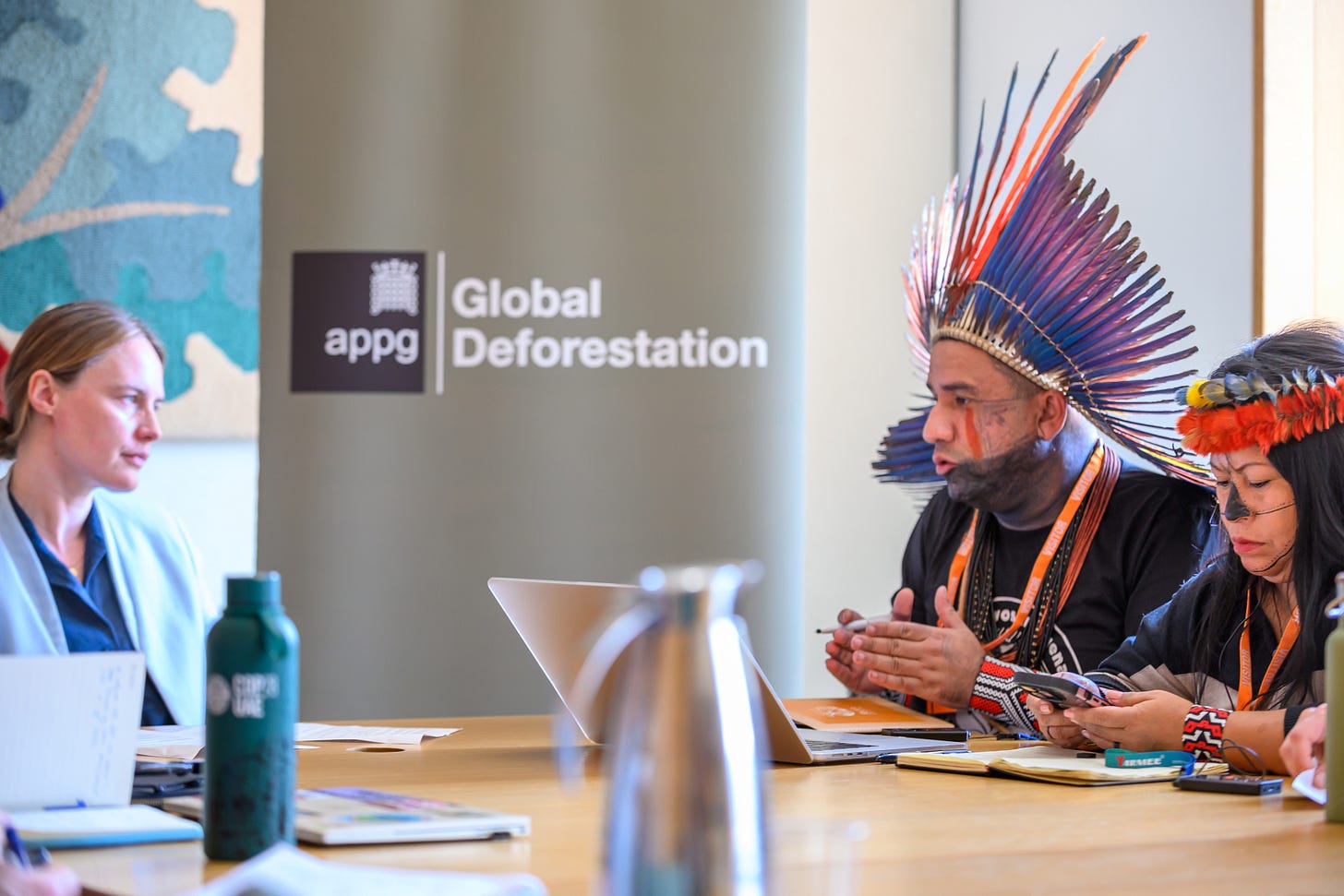‘There are various things we want the UK government to do on deforestation’
Interview with Brazilian indigenous leader Dinamam Tuxá during his visit to London

This week three indigenous leaders - two from Brazil, one Malaysia - visited London to urge the UK government to significantly intensify its efforts to combat global deforestation in the run-up to the next United Nations climate change conference, “COP30”, to be held in Brazil this November. One of those leaders was Dinamam Tuxá, a Tuxá man and Executive Coordinator of the Articulação dos Povos Indígenas do Brasil, a federation celebrating its 20th anniversary this year and representing more than 300 indigenous peoples across Brazil. Just before his meeting on Tuesday with the All Party Parliamentary Group (APPG) on Global Deforestation, I was able to interview Tuxá, through a translator, about his visit:
DH: What are you asking the UK government to do?
DT: There are various things we want the UK government to do, but they’re mainly focused around one financial pledge as well as a territorial pledge with regards to indigenous people. We think that the UK government is in the right space to lead on this process, so we’re asking them to continue and make real the commitments they made in Glasgow [with various other countries and a number of philanthropic foundations during COP26 in 2021] about recognising indigenous people and providing funding directly to them.
DH: Why do you say the UK is in the “right space to lead on this process”?
DT: Because they’re already leading on this process. That’s why we’re here. And so what we’re asking is that they ensure that the funding that is being pledged actually gets to indigenous people and the other places it needs to, in order to make a real difference. Of the money that was pledged in Glasgow [US$1.7 billion], only two percent actually got to indigenous people on-the-ground. We need that to change.
DH: How initially did you feel when that pledge in Glasgow was announced?
DT: Glasgow was a turning-point because it was the first time indigenous people were officially recognised and put into the centre of the climate change fight. It was also the first time direct funding was mentioned, and it was the first time that our integral role in protecting the world was recognised.
DH: Regarding any upcoming financial pledge, how much money are we talking about? How much money will be on the table at COP30?
DT: We don’t know yet. We don’t have any numbers yet for the funding. There’s another pledge we’re putting on the table which is about land recognition for indigenous people: a global objective to obtain statements and actions supporting the protection and official recognition of indigenous lands throughout the world.
DH: Do you have more details on that pledge? What would it involve exactly?
DT: The FCLP [Forest & Climate Leaders’ Partnership] is discussing that. It’ll be announced at COP30. Another thing we want to push while we’re here is the importance of the UK’s deforestation law [the 2021 Environment Act, which includes a section on “forest risk commodities” but hasn’t come into force yet]. We’re pushing for that to be more ambitious. We want it to include more biomes, because it’s not just the Amazon and forests that are being affected. We also want it to include more products, more commodities, including minerals.
DH: When you say minerals, do you mainly mean gold?
DT: Gold. Critical minerals and gold.
DH: At the moment the UK Environment Act only talks about illegal deforestation. Do you think it should also include all deforestation?
DT: Yes. That’s exactly one of the purposes of our advocacy.
DH: The Act also only talks about “local laws” being respected, rather than international law and indigenous rights specifically. Do you think that the British legislation should also take on international standards as well?
DT: Yes. A lot of this deforestation means we’re being invaded and so, whether our territory is demarcated or not by local laws, it is still a violation of our rights. One of the other ways the Act could be more ambitious would be to make it easier to identify the companies who are committing crimes and invading our territories, and allow us to try them for those crimes.
DH: Which of the commodities coming into the UK [and likely to be included within the scope of the Environment Act] are the most important in terms of impacting indigenous people in Brazil?
DT: Soy is the big one - and also gold. That question touches on a really important point. There’s an extra issue here, because a lot of products come into the EU first and then into the UK. So traceability is a massive issue. This - traceability - is another thing we really need to push for [in the Environment Act].
DH: Just one more question. Are you speaking to governments other than the UK? Have you come from Brazil just to the UK, or are you going to France, Germany?
DT: We’re going to the EU Commission and will be speaking to various politicians from various countries in the EU too.
DH: Any final things to say?
DT: I just want to say another thing. We’re fed up with greenwashing. What we really, really need are specific, effective measures at COP30 that can actually make a difference. And we really believe that the pledge for territorial demarcation is a way of making very specific, real changes on-the-ground. Another is about having a more ambitious deforestation law in the UK. And we think an essential part of that is for the UK to pressure the Brazilian government to not approve a package of laws currently being discussed that will weaken indigenous land rights and go against our Constitution, and which will allow agribusiness onto our lands.
DH: Dinamam, thank you very much.
